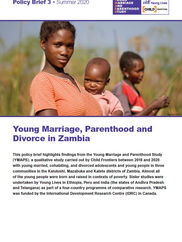Young Marriage and Parenthood Study
by Dr. Gillian Mann
August 2020
This project was made possible through generous funding by the International Development Research Centre (IDRC)
The aim of the Young Marriage and Parenthood Study (YMAPS) was to enhance the understanding of the complexities of child marriage and parenthood in order to inform policies and programming globally, regionally and in the four specific country contexts where the research took place (Ethiopia, India (united Andhra Pradesh), Peru, and Zambia).
Despite a growing body of understanding about why girls get married, there is scant information about what happens after marriage/cohabitation and how being married or in a union alters girls’ and boys’ life trajectories. We know little about what supports the quality of married life, including girls’ and young women’s agency and decision-making in family contexts, intergenerational relationships, or what contributes to divorce or separation. How are social norms about childhood and adulthood, and about motherhood, fatherhood and parenthood more generally applied to adolescent mothers and fathers? Research to date has emphasized the drivers and immediate consequences for girls and young women who marry, yet there is little qualitative evidence on the long-term outcomes – both positive and negative – of these practices or on the most effective means of bringing about positive change. As a consequence, there is limited understanding of how health, education, violence and livelihoods interventions need to be adapted to meet the needs of adolescent parents or children who are married/in union.


Our team in Zambia

The first picture is of me with Rodah Muchindu, our self-described 'granny-researcher' who was involved last year in the YMAPS data collection. While she didn't do the digital story/Photo Voice work with us this time, we met up in Mazabuka and shared findings and got her involved in the analysis of some of the new and emerging data. The young people responded so well to having an elderly woman interview them. It was great!

And these two laughing people are Kennedy Mundia and Kabuswe Mbalazi, our stars on the ground.

Kabuswe on the right, our fabulous researcher for YMAPS in Zambia. She’s accompanied by Bridget, a young mother in Twaiteka compound near Kalulushi in the Copperbelt. We spent a superb day doing Photo Voice and video.
YMAPS was carried out over a period of two and half years and was completed in July 2020. It drew upon existing multi-country longitudinal data from Young Lives, as well as a 2016 study carried out by Child Frontiers in Zambia. It used a mixed methods approach to learn from 345 single parents and married and divorced children and young people, their parents and service providers in four countries: Ethiopia, India (united Andhra Pradesh), Peru, and Zambia.


The overall research was led by Young Lives (University of Oxford), in collaboration with Child Frontiers (Zambia), Grupo de Analisis para el Desarollo – GRADE (Peru) and the Ethiopian Development Research Institute (EDRI). It was framed by a socio-ecological life course perspective and used a relational approach to gender and generation, examining the relationships, power structures, and norms and practices that influence adolescents’ and young people’s transitions, not only in terms of motherhood and marriage but also with respect to boys, marriage, fatherhood, and the formation of new households.
The results of the study are available in several different media: country-level research reports, a comparative synthesis report, two international policy briefs, country level policy briefs, book chapters, digital stories created by young married, divorced and single parents, webinars, seminars and an animation.






